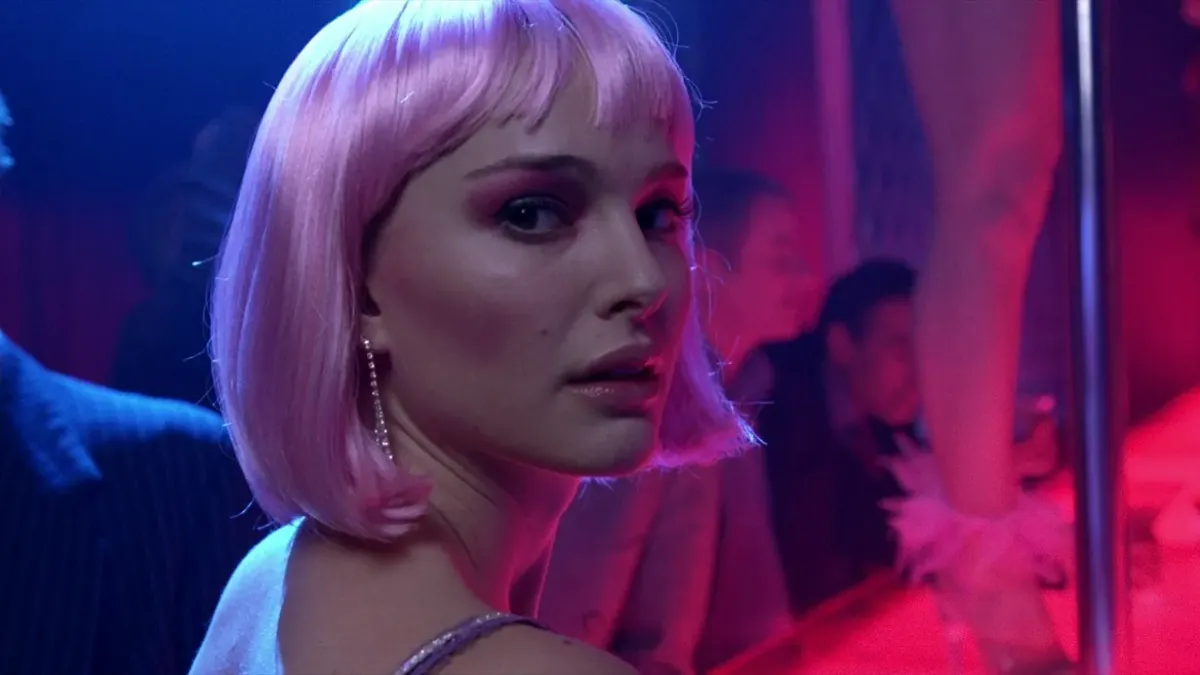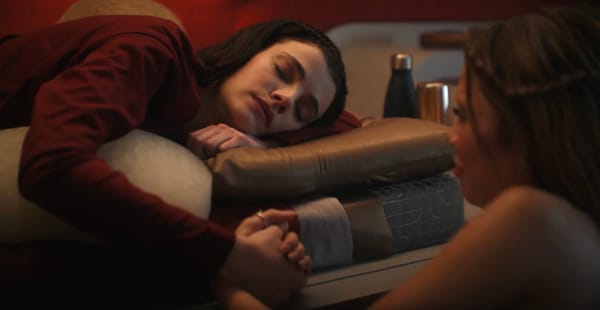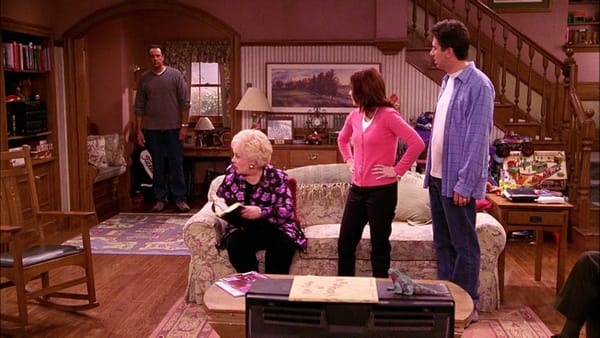Kirsten and Natalie #7: Eternal Sunshine of the Spotless Mind and Closer
In which our heroes try to understand the human heart

(Kirsten and Natalie is a series tracing American womanhood as portrayed through the films of Kirsten Dunst and Natalie Portman. Read the introductory post here.)
When I was younger, I thought Michel Gondry's Eternal Sunshine of the Spotless Mind was one of the most honest movies about human relationships. Its portrayal of a man erasing his girlfriend's memory, only to realize how badly he wants to keep that memory, is deeply moving, frequently profound, and occasionally hilarious. I still consider the movie one of my favorites ever made, and I still think it's being honest in a very particular way. Yet that honesty has enormous blinders on. It's a masterpiece that can only see directly in front of it, but boy, what it can see in a straight line extending forward!
Mike Nichols's Closer thinks it's one of the most honest movies about human relationships. It tap dances furiously, hoping to convince you that it is saying anything. Its characters speak in elliptical dialogue that is meant to be clever but that is, like so much "clever" dialogue, fundamentally empty. It's a movie about sex and relationships between men and women that ultimately comes to the conclusion that men are too possessive sometimes. It comes to that conclusion roughly seven times across its final hour. I did not like this movie when I saw it in 2004, and I like it even less now, despite being a much bigger Nichols appreciator overall.
When I paired Eternal Sunshine and Closer for this series, I was thinking primarily about their year of release — 2004 — and their critical receptions. Eternal Sunshine garnered two Oscar nominations and won the Original Screenplay prize, while Closer also garnered two nominations, including Natalie Portman's first (for Supporting Actress). Both were relatively well reviewed then, though Eternal Sunshine had better reviews and has gone on to have a longer-lasting cultural footprint. Watching it in 2022, I was astonished at how many movies have ripped it off wholesale across the last 18 years. Screenwriter and director Charlie Kaufman's whole deal has been ripped off over and over again, but something about Eternal Sunshine's fuzzy melancholy spurred more homages than usual.

Yet watching them in close proximity, I was struck by how similar they are. Oh, sure, Eternal Sunshine is a film through and through, while Closer wears its stage-play roots on its sleeve. But they're both concerned with the truths of modern romance and believe they possess the skeleton key to understanding men and women and heterosexuality. Yet where Closer really does seem to think it's figured something out, Eternal Sunshine's success comes from how it understands that any universal truths it tries to impart will necessarily be less important than its specificities. The mesmerizing final 10 minutes of Eternal Sunshine somehow pull an incredibly universal theme — 'tis better to have loved and lost than to not have loved at all — out of what would seem to be an impossibly idiosyncratic tangle.
For purposes of this series, however, what's striking is how similarly Eternal Sunshine and Closer treat our favorites. Dunst and Portman play the most important supporting roles in these two films, and they both play what I might call proto-manic pixie dream girls. (We'll get to full-fledged MPDGs in our next installment.) Portman's Alice Ayres is far too troubled and bruised to be an MPDG, but she seems to be the kind of woman men bend their lives out of shape to be with. The same is true for Dunst's Mary Svevo, whom fully two supporting cast members are revealed to have been involved with and who possesses such potentially grating personality traits as loving to just read random bits from Bartlett's Familiar Quotations.
I always forget just how important Dunst is to Eternal Sunshine because the scenes about the film's central couple, Joel (Jim Carrey) and Clementine (Kate Winslet), are seared into my memory. Yet Dunst is the one who reads the Alexander Pope quotation that gives the film its name, and she's the one who ties together the graceful final act. In the hands of a lot of actors, Mary would have been a thankless role, the cute receptionist who slept with her boss. In Dunst's hands, Mary becomes someone wounded and specific, someone with the energy of a high school valedictorian whose life didn't turn out quite as she'd hoped. She's also funny, bringing little bursts of goofiness to a movie that can be dour.
Eternal Sunshine's B-plot involving the employees of Lacuna, the service that Joel and Clementine hire to erase their memories of each other, probably shouldn't work. For one thing, it's structured like the pilot for a TV show about the people who work at Lacuna. With how silly it can be, it probably should feel like the result of a studio note: "Let's get some hijinks in here! This is too sad!" By the time Dunst and Mark Ruffalo are dancing in their underwear over Jim Carrey's sleeping form, a lesser movie would have collapsed under the weight of its goofiness.
Yet the B-plot sustains itself, and the more you think about it, the more you realize that's thanks to Dunst. Ruffalo, Elijah Wood, and Tom Wilkinson are all playing more obviously comedic characters, and even David Cross and Jane Adams get more laugh lines in much smaller roles. But all through the film, Kaufman's script is playing the horrors of living in a world where people just... erase their grief, rather than deal with it. When you discover that Mary and her boss had an affair, then she had him erase her memory of it, it underlines what's profoundly fucked up about the film's whole conceit. Including the "the Lacuna employees screw around" plot does a lot to create verisimilitude for this obviously fake technology. Then, by putting this gut-punch revelation in the middle of the comedic B-plot, Kaufman does just as much to ground the film's final themes. It's a deft bit of screenwriting, but none of it would work without Dunst's portrayal of a woman who realizes she's been hollowed out and used by a man she once loved.
(Sidebar: I think it's interesting how this film's portrayal of Clementine and Mary suggests that part of what makes them so kooky and goofy in their post-memory erasure state is the way that their reality has been fucked with to remove anything hard or difficult. I've often seen Clementine described as a manic pixie dream girl. I don't think that's the case, though her specific brand of twee anhedonia influenced the archetype. I do find it fascinating that Kaufman has built a critique of the archetype he's helping to invent right into the character from the first few scenes in which we meet her — if this woman existed, she would probably have a deep despair her quirkiness was covering up.)

Closer, based on the play of the same name by Patrick Marber, involves a quartet of people who keep hopping into each other's hearts, lives, and beds. It's a decidedly theatrical conceit, and its core claustrophobia is weirdly ill-suited to film, where it feels a bit airless. You could have made this play on TV (where claustrophobia is baked into the medium) or in a novel. But in a movie? Movies have to fight very hard to keep from tilting into maximalism. And Closer never fights hard enough. As such, the film fundamentally turns into a series of scenes of tremendous actors shouting at each other about things that have little to no dramatic stakes.
This film ended up being something of a coronation for Portman, as she swept into the role of ingenue alongside Julia Roberts, Jude Law, and Clive Owen. She won a Golden Globe for her work, and she probably gives my favorite performance in the film. (Owen is fantastic when he's good, and when he's bad, he's just randomly shouting words in a way that is entertaining but maybe not good.) Portman also does a good job of playing a character the film itself knows is impossible to play: the woman who's so pretty everybody assumes they know her, even though nobody does. But at a certain point, when the film ends with the reveal that her real name was the one she told Owen's character in a strip club one time, I wanted the movie to dare more with her character or with any of its characters. Realizing that a character you've written is a cipher is a good first step if you want to make her not a cipher. Leaning into it and saying that her cipherness is the point... well, it's a bit of a cheat. You have to be Charlie Kaufman good to pull that off, and Marber isn't.
Closer has aged poorly for several reasons. For starters, time is rarely kind to stage play adaptations, which only feel more stagebound as cinematic language moves past them. Next, you can consider that the film's portrayal of how the internet had affected human courtship and sexuality was already dated in 2004. What was a bold coup de theatre — two dudes cybersex together, except one of them is saying he's a woman — in 1997 doesn't play onscreen in the same way. (Indeed, contemporary reviews of the play mentioned this scene almost to a one; reviews of the film rarely bring it up.)
Most of all, however, the film has aged poorly because it's ultimately not saying anything. Marber writes clever dialogue, which is to say that he writes dialogue that seems witty and urbane when delivered by good actors but which is fundamentally empty when you go looking for any meaning in it. Take this early exchange between Law (Dan) and Portman (Alice), when they have first met and are flirting:
Dan: Didn't fancy my sandwiches?
Alice: Don't eat fish.
Dan: Why not?
Alice: Fish piss in the sea.
Dan: So do children.
Alice: Don't eat children, either.
The dialogue here is basically okay in terms of giving us two people bouncing off of each other. It's clever. And yet, if you look at it for two seconds, very little of it makes sense. Why are these people responding to each other's lines in this fashion? Where does "So do children" come from? What is happening here?
"Clever" is one of my most-loathed descriptors. We tend to take it as a synonym for "smart," which it is, but it usually means "smart, but in a facile way." When a screwball comedy is clever, that's a good thing. But when something like Closer is clever, it's treating the stories of these four people as a chance to toss some bon mots back and forth across the net. It's not rooted in anything real; it's rooted in a supreme sense of self-satisfaction. In the case of a movie like this, cleverness is used to cover up just how little it has thought about any of the ideas it presents. Hell, the play version of Closer ends with Alice dying. That's how cynical it is about any of its characters as something other than an opportunity to offer an intellectual exercise.
Both Closer and Eternal Sunshine pivot on how badly the men in the story misunderstood the women in the story. But where Eternal Sunshine believes this to be a tragedy that might be solvable with time and compassion, Closer throws up its hands and says, "What are you gonna do!" Neither Dunst nor Portman is really playing a character in these movies because they are playing The Woman Who Gets Fucked With. But only one of these films understands that the woman who gets fucked with is something more than an archetype.
Alice Ayres spits so, so, so, so, so, so many words, laced with invective and spite and sarcasm, but she only ever feels like a construct, a paper-thin being conjured out of a man's brain. No one listens to her, and that's inevitable. Mary Svevo has much less to say, but that's by design. No one listens to her, and that's a tragedy.

In September: Kirsten and Natalie gets to the place it's always been heading: a side-by-side comparison of Garden State and Elizabethtown. See you then!!!
Talk back to me: Which memories are you erasing? Tell me in the comments or by replying to this email.
What you missed not being a subscriber to Episodes: Steve Erickson's take on the nostalgia laced throughout recent horror movies is a sharp piece of writing on horror and our current cultural nostalgia obsession.
The narrative that history’s arc always leads towards progress, which may have looked justified in the ‘60s and ‘70s, is being proven wrong by this moment, where our future looks like climate change, increasing political repression and destruction of civil rights, and endless waves of disease. Sometimes, the turn toward nostalgia takes more benign forms. For instance, this summer, Kate Bush’s “Running Up That Hill” became a much bigger hit than it was during its original release, thanks to its use in Stranger Things’s fourth season. But even in those more benign cases, nostalgia takes the place of a search for forms of expression that can do justice to the present.
Read me: This look back at the war between old-guard sportswriters and the early sports blogosphere is an incredibly smart and empathetic piece of writing that builds to a wide-ranging conclusion I'm not sure I 100 percent agree with but that I enjoyed reading.
Not long after Costas Now looked at blogs as the future, Twitter would instead take over, with its major influencers speaking in Deadspin’s tone. Actually, to be wholly accurate, old Deadspin was more elevated than the standard media discourse on their favorite medium. Worse than Twitter’s baseline tone is just the omnipresent, reflexive demonization and collective will to hurt outgroup individuals. Connected to that is a panicky willingness to buy into emotionally charged stories that you don’t dare question your in-group on. Did we all become Deadspin? No, Deadspin wasn’t like this in 2008. But, if I’m honest, it was probably one more step to wherever we are. And this current place, perhaps a hell and perhaps a purgatory, is an ever-changing but seldom evolving shit show. It’s been one big refutation of the once-ballyhooed idea that we should all be speaking to each other, constantly.
Watch me: Shut Up and Sit Down makes talking about tabletop gaming seem easy-peasy, and their new "how to get into tabletop RPGs" video is a delight. Worth watching even if you're already a devotee of the hobby! I learned some things!
And another thing... I was on the most recent episode of Good Christian Fun to discuss The Passion of the Christ and to make A MAJOR ANNOUNCEMENT. (Seriously, it's a major announcement.)
Opening credits sequence of the week: I recently have been burning through some Better Call Saul episodes. I had noticed but never quite internalized how the show's opening credits sequence degrades across its run. Now there's a video to show me just that!
A thing I had to look up: Even though everybody in Eternal Sunshine has a great last name, I had to go and remind myself that it was Mary Svevo. Well! We can't all be perfect!
This week's reading music: "Everybody's Gotta Learn Sometime" by Beck
Episodes is published twice per week. Mondays alternate between a free edition on various topics and a subscriber-supported edition where I recap TV shows of interest. Fridays offer pop culture thoughts from freelance writers. The Friday edition and the biweekly recaps are only available to subscribers. Suggest topics for future installments via email or on Twitter. Read more of my work at Vox.




